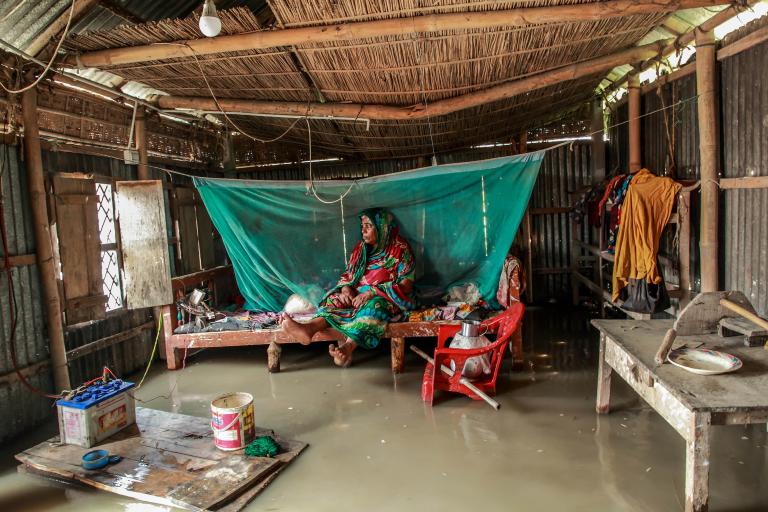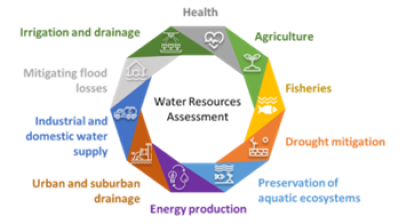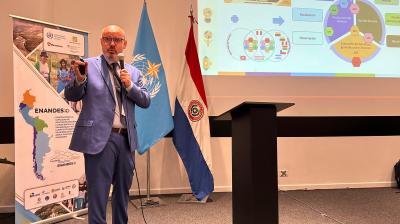World Water Forum calls for more integrated management
Indonesian President Joko “Jokowi” Widodo officially opened the Forum in Bali, just as his country mourned dozens of victims of a “cold lava” mudslide from the Mount Merapi volcano, triggered by heavy rainfall.
Hundreds of people have been killed by historic floods in Brazil and East Africa and by flash floods in Afghanistan. Central America and southern Africa face extreme drought.
“These disasters once again show the vulnerability of society to the cascading impact of water-related hazards: either in the form of too much or too little,” WMO Secretary-General Celeste Saulo said in a statement to the conference. “Better forecasts and risk management are pivotal to the success of Early Warnings for All.”
Asia is the region worst affected by weather, climate and water-related disasters. 80 percent of these were due to flood and storm events in 2023. There were more than 2,000 fatalities and nine million people directly affected.
At the same time, 3.6 billion people globally face inadequate access to water at least a month per year and this is expected to increase to more than 5 billion by 2050.
A ministerial declaration issued an urgent call for more efficient and integrated water resources management; more financing of climate change adaptation and biodiversity and ecosystem loss; and accelerated progress towards the Sustainable Development Goal 6 on safe and affordable drinking water and sanitation for all.
The World Water Forum is held every three years. The theme this year is Water for Shared Prosperity. It brings together tens of thousands of participants from international institutions, academia, civil society and the private sector.

Early Warnings for All
Celeste Saulo highlighted the growing momentum of Early Warnings for All at a series of high-level panels, including with Egypt’s Minister of Water resources and Chair of the African Ministers Council on Water, Hani Sewilam, Indonesia’s Minister of Public Works Basuki Hadimuljono, and Dwikorita Karnawati, head of the Indonesia’s Meteorological, Climatological and Geophysical Agency (BMKG), which plays a key national, regional and global role in flood and drought management programmes.
Early Warnings for All initially prioritizes 30 countries for action, although many others are also targeted. WMO is working with partners to establish national early warning service roadmaps and coordination mechanisms.
Early warnings work, said Celeste Saulo
For instance, following the disastrous Cyclone Idai in 2019, Mozambique made early warning systems a priority and this helped greatly reduce human casualties and economic losses when Category 5 Cyclone Freddy hit in 2023.
Tropical cyclone Mocha in 2022 is another example. It was the strongest cyclone in the Bay of Bengal in the last decade and hit highly vulnerable communities in Bangladesh and Myanmar. Meteorological and Hydrological services – both at regional level in India and nationally in Bangladesh and Myanmar – issued accurate forecasts, which were relayed by TV, radio and mobile phones. Red Crescent volunteers sensitized local communities and humanitarian agencies mobilized relief items.
“We can say with certainty that early warning and anticipatory action saved literally thousands of lives from cyclone Mocha,” said Celeste Saulo.
Hydrology Action Plan
WMO works to strengthen and integrate hydrological services to support climate change adaptation. A major obstacle is the lack of information about the currently available water resources, future availability, and demand.
Today, 60% of WMO Member States report declining capabilities in hydrological monitoring.
Therefore, WMO has a wide-ranging Hydrology Action Plan, with eight long-term ambitions:
- No one is surprised by a flood.
- Everyone is prepared for drought.
- Hydroclimate and meteorological data support the food security agenda.
- High-quality data supports science.
- Science provides a sound basis for operational hydrology.
- We have a thorough knowledge of the water resources of our world.
- Sustainable development is supported by hydrological information.
- Water quality is known.
Climate action is water action. Operational hydrology and National Meteorological and Hydrological Services have a great role to play for climate and water resilience. Building partnerships to achieve the Sustainable Development Goals (SDGs) and to build resilience in a rapidly changing climate is at the core of the WMO agenda.
- WMO Member:
- Indonesia










